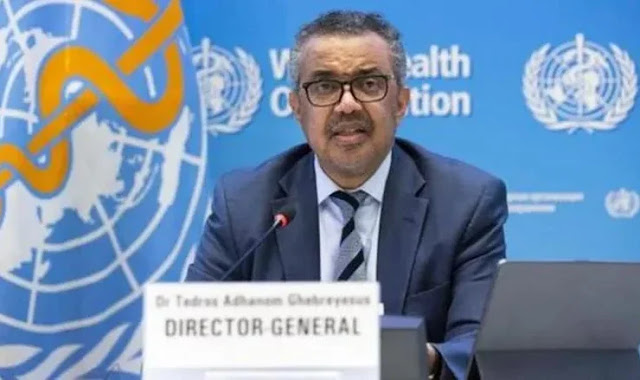#jaiyeorie
Approximately 98 percent of reported instances involved males who had sex with many other men, according to WHO data released on Wednesday.
The WHO requested that this group temporarily restrict the number of sexual partners, think twice before having sex with any new partners, and exchange contact information with any new partners in order to facilitate follow-up, if necessary.
The WHO emphasized, however, that anyone can contract the disease.
Tedros Adhanom Ghebreyesus, the director-general of the WHO, said:
“In addition to the transmission through sexual contact, monkeypox can also be spread in households through close contact between people, such as hugging and kissing, and on contaminated towels or bedding.”
Due to an increase in monkeypox cases in many countries, the World Health Organization has for the first time made specific guidelines about sexual behavior for people who are most vulnerable.
He continued by saying that if nations, communities, and people became informed, took dangers seriously, and took the necessary actions to restrict transmission and protect vulnerable populations, the outbreak could be prevented.
According to Ghebreyesus, there are still unanswered issues surrounding the efficiency of the monkeypox vaccine or who exactly needs to receive it.
The health organization does not recommend mass vaccination, but “targeted vaccination for those exposed to someone with monkeypox, and for those at high risk of exposure, including health workers, some lab workers, and those with multiple sexual partners.’’
More than 18,000 cases from 78 countries have been reported to the WHO, with more than 70 per cent of infections recorded in European countries, many of which had previously known virtually no monkeypox cases.
On July 23, the WHO declared the monkeypox outbreak an “emergency of international concern.’’
WHO Technical Lead on Monkeypox, Dr Rosamund Lewis, said at a press briefing at the UN health agency’s headquarters in Geneva that countries should act fast to stop the spread of the virus.
In 2022, there have been more than 16,000 confirmed cases of monkeypox in more than 75 countries. Lewis said the real number was probably higher.
Lewis pointed out that in the Democratic Republic of the Congo, several thousand cases were suspected, but testing facilities are limited.
“The global dashboard did not include suspected cases,” she said.
Some 81 children under the age of 17 were reported as having been infected globally, she added, with the majority of cases being among young men, with the median age being 37.
First identified in monkeys, the virus is transmitted chiefly through close contact with an infected person.
Until 2022, the virus which causes Monkeypox has rarely spread outside Africa where it is endemic. But reports of a handful of cases in Britain in early May signalled that the outbreak had moved into Europe.
Lewis pointed out that stigma and discrimination must be avoided, as that would harm the response to the disease.
“At the moment the outbreak is still concentrated in groups of men who have sex with men in some countries, but that is not the case everywhere.
“It is really important to appreciate also that stigma and discrimination can be very damaging and as dangerous as any virus itself,”
she said.
Monkeypox could cause a range of signs and symptoms, including painful sores. Some people developed serious symptoms that need care in a health facility.
Those at higher risk for severe disease or complications include pregnant women, children, and immunocompromised persons.
Lewis said WHO was working with the Member States and the European Union on releasing vaccines, and with partners to determine a global coordination mechanism.
She stressed that mass vaccination was not required, but the WHO had recommended post-exposure vaccination.
Vaccine sharing should be done according to public health needs, country by country and location by location. Not all regions had the same epidemiology, she explained.
Lewis stressed that countries with manufacturing capacity for smallpox and Monkeypox diagnostics, vaccines or therapeutics should increase production.
Countries and manufacturers should work with WHO to ensure they are made available based on public health needs, solidarity and at a reasonable cost to countries where they were most needed.
Lewis explained that some 16.4 million vaccines were currently available in bulk but needed to be finished. The countries currently producing vaccines are Denmark, Japan, and the United States.
She stated that the current recommendation for persons with Monkeypox was to isolate and not travel until they recovered; contact cases should be checking their temperature and monitoring possible other symptoms for the period of nine to 21 days. She added:
“When someone is vaccinated it takes several weeks for the immune response to be generated by the body.”
According to Lewis, the name “Monkeypox” is already present in the International Classification of Diseases, and a process had to be followed in order to potentially change its name.
Source: DPA/NAN
✍️✍️✍️ ✍️“feel free to disagree in the comments 👀 ☝️👆 & let JAIYEORIE know what U think!” 📎 COMMENTS 👈👉✍️🤳 DROP YOUR OPINIONS ✍️✍️✍️

No comments:
Post a Comment